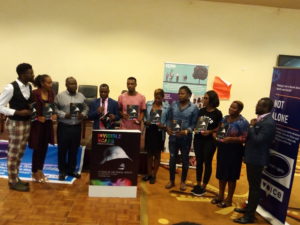Ugandan report: Anti-LGBT bias, violence take a high toll on mental health
Kikonyogo Kivumbi is the executive director of the Uganda Health…
Violence, murder of LGBT community members, family rejection, societal and institutionalised discrimination, name calling and shaming take a high toll on the mental well-being of LGBT and queer Ugandans, according to a new report released Thursday in Kampala.
From the African Human Rights Media Network

By Kikonyogo Kivumbi
Human rights defenders in Uganda have released a new report documenting the effects of violence and social and institutional rejection on the mental health of LGBT and queer community members activists and queer people in the country.
The report ” Invisible Scars” was compiled by Elvis Herbert Ayesiga, the director of programs at Ice Breakers Uganda.
It was supported by Voice Global, an innovative grant-maker that supports the most marginalised and discriminated-against people in 10 low- and lower-middle income countries in Africa and Asia. It aims to amplify and connect thus-far-unheard voices in efforts to leave no one behind.
The report details Ayesiga’s own road to self-discovery and unveils the mental scars suffered by LGBT persons in Uganda.
A total of 251 people — health workers, government employees, non-government workers, friends, and families of LGBT persons — were interviewed during the preparation of the report. Ayesiga notes in the report:
“For many lesbian, gay, bisexual and transgender (LGBT) people, this has been the reality of their childhood and their development into adulthood. The lasting effects of experiences with such prejudices and discrimination are profound.”

About the report
The research elicited 251 respondents who agreed to participate. Respondents included LGBT persons, those out and those still in the closet, activists, health care providers, psychiatrists, family and friends.
Twenty-two family members (13 female and nine male) were interviewed one-on-one, as well as 30 friends (18 female and 12 male). In addition, 5 health-care providers from different institutions answered questionnaires and online calls.
Two focus group discussions were conducted with LGBT persons. Each group had 20 participants, which made a total of 40 participants. Twelve LGBT activists were reached through one-on-one interviews;3 8 LGBT in the closet between the ages of 20 and 40 through one-on-one interviews families and friends in Uganda, were reached in the same way.
Research findings
Among the 184 LGBT respondents, 31 were lesbian, 63 were gay and 43 were bisexual (17 female and 26 male). There were 28 transgender people, 11 trans men and 17 trans women. Nineteen participants were not sure or not ready to apply a label to themselves, and they represented themselves as queer.
The report stated:
“This research confirms that LGBT individuals face health disparities linked to societal stigma, discrimination, and denial of their civil and human rights. Stigma and discrimination against LGBT persons have been associated with high rates of psychiatric disorders, substance abuse, and suicide.
Personal situations and social acceptance of sexual orientation and gender identity affect the mental health and personal safety of LGBT individuals.”
“Invisible Scar”s further notes that according to the US National Alliance on Mental Illness (NAMI), the risk of a mental health condition, such as depression, anxiety disorders, or post-traumatic stress disorder, is almost three times as high for youth and adults who identify as LGBT.
There are 300 million people who suffer from depression worldwide, according to WHO.
In Uganda, a research study, “The prevalence of depression in two districts in Uganda,” conducted in January 2005, found that as many as up to one in six inhabitants in two districts, Adjumani and Bugiri, showed signs of depression.That is every sixth person around you. And it is a growing problem. By 2020, WHO predicts that depression will be the second-leading cause of world disability; and by 2030, it is expected to be the largest contributor to disease burden in the world. While individuals from the LGBT community are likely to experience a mental health condition at three times the rate, the chances of suffering from a major depression are twice as high as that of the general population.
Kikonyogo Kivumbi, the author of this article, is the executive director of the Uganda Health and Science Press Association





The points raised in the report are important and the remark you made “While individuals from the LGBT community are likely to experience a mental health condition at three times the rate, the chances of suffering from a major depression are twice as high as that of the general population,” is informative. It is true there is vulnerability and susceptibility faced by LGBTIQ+ Identifying or Transitioning Persons. ” I agree with you “the risk of a mental health condition, such as depression, anxiety disorders, or post-traumatic stress disorder” are higher in this demography. It manifests as: Fear of engaging in community activities; a barrier to agency, autonomy and self determination; it leads to engaging in habits such as alcohol,, drug and substance abuse which lead to disorders; it leads to less productivity and hence destabilized life. These and more manifestations have led to poor self esteem and self confidence. But, all is not lost! Some of the ways to overcome this have been devised by many LGBTIQQ-led organizations. The LGBTIQQ Social Support or Mutual Aid Groups do a commendable job. Whereas the services at their disposal are basic, they nevertheless, have tailored, mobilized and appropriated mechanisms addressing traumas and vulnerabilities. These organizations have shown that resilience like gender spectrum is expansive. This report is evidence that there are many ways to address stress, depression. Telling one’s own story leveraged against a backdrop of social contexts shows a new norm. There are various LGBTIQQ Organizations using this approach. Thanks for sharing.
I was unable to find a copy of the report itself online. It seems the Ice Breakers site has been hacked and the link brings you to a pornography site. Can you provide a working link to the report?
We believe that this link is now working:
https://voice.global/assets/2019/11/InvisibleScars.pdf